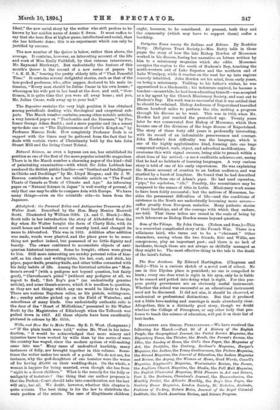Forty - two Years among the Indians and Eskimo. By Beatrice Batty.
(Religious Tract Society.)—Mrs. Batty tells in these pages the story of how the late Bishop Borden of Moosonee worked in his diocese, basing her narrative on letters written by him to a missionary magazine which she edits. Moosonee occupies the region to the south of Hudson's Bay, touching the north-western end of Lake Superior and the northern end of Lake Winnipeg, while it reaches on the west far up into regions scarcely inhabited. John Borden set his mind, from early years, on being a missionary. Yielding to his father's wishes, he was apprenticed to a blacksmith ; his indenture expired, he became a teacher—meanwhile, he had been educating himself—was accepted as a lay agent by the Church Missionary Society, and sent out to Hudson's Bay. His work was so successful that it was settled that he should be ordained. Bishop Anderson of Rupertaland travelled fifteen hundred miles to perform the rite, making a progress through his diocese as he went. This was in 1852, when Mr. Borden had just reached the prescribed age. Twenty years later he was consecrated first Bishop of Moosonee, which then became one of the divisions of the huge diocese of Rupertsland. The story of these forty odd years is profoundly interesting, with its record of an indomitable perseverance and courage. John Borden's first difficulty was the language, which is one of the highly agglutinative kind, forming into one huge compound subject, verb, object, and adverbial modifications. He overcame this with signal success, being able to preach within a short time of his arrival,—a most creditable achievement, seeing that he had no habitude of learning languages. A very curious story is told of one of his early experiences. He was explaining the Mosaic account of creation to an Indian audierrae, and was startled by a burst of laughter. He found that he had described Eve as made from one of Adam's pipes. He had used ospwakun, "pipe," for ospikakun, "rib." Possibly, the resemblance may be compared to the senses of tibia in Latin. Missionary work seems to have been fairly successful ; but the natives of Moosonee, be- sides the permanent difficulties of life—and the conditions of existence in the North are undoubtedly becoming more severe— suffer greatly from European maladies. Many pathetic stories of their hardships, and of the courage with which they endure, are told. That these tribes are raised in the scale of being by such labourers as Bishop Borden seems beyond question.






































 Previous page
Previous page